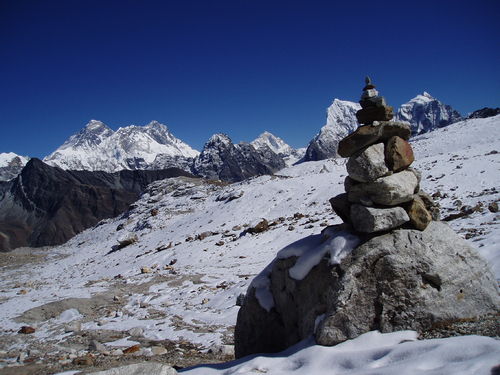Différences entre les versions de « Program of the Kathmandu 2012 Workshop »
Aller à la navigation
Aller à la recherche
| Ligne 69 : | Ligne 69 : | ||
|} | |} | ||
| − | |||
| − | |||
| − | |||
== Speakers and titles of the talks == | == Speakers and titles of the talks == | ||
| Ligne 115 : | Ligne 112 : | ||
# Tomasz Wesolowski: Joining seamlessly microscopic and macroscopic levels of description of matter: challenges and perspectives for modelling methods based on Frozen-Density Embedding Theory | # Tomasz Wesolowski: Joining seamlessly microscopic and macroscopic levels of description of matter: challenges and perspectives for modelling methods based on Frozen-Density Embedding Theory | ||
# Weitao Yang: TBA | # Weitao Yang: TBA | ||
| + | |||
| + | ==Abstracts== | ||
| + | |||
| + | '''[[Abstracts of the Kathmandu Workshop 2012| The abstracts will be uploaded soon]]''' | ||
<center> | <center> | ||
Version du 10 novembre 2011 à 12:46
Bodhnath Stupa
Schedule
| Monday April 30 | Tuesday May 1 | Wednesday 2 May | Thursday 3 May | Friday 4 May | |
|---|---|---|---|---|---|
| 9:00 - 9:30 | Pal | Broer | Graovac | Minot | |
| 9:30 - 10:00 | Scuseria | Daul | Martin Pendas | Markovits | |
| 10:00 - 10:30 | Bultinck | Helgaker | Cardenas | Chen | |
| 10:30 - 11:00 | Break | Break | Break | Break | |
| 11:00 - 11:30 | Okopinska | Yang | Wesolowski | Fuentealba | |
| 11:30 - 12:00 | Cioslowski | Grabowski | Causa | Alikhani | |
| 12:00 - 12:30 | van Aggelen | Baer | Frauenheim | Derat | |
| 12:30 - 13:00 | Piris | Ernzerhof | Ayers | Salahub | |
| 13:00 - 15:00 | Lunch | Lunch | Lunch | Lunch | |
| 15:00 - 15:30 | Excursion to Patan | Borgis | Excursion to Bodhnath | Departure | |
| 15:30 - 16:00 | Dobson | ||||
| 16:00 - 16:30 | Welcome | Kronik | |||
| 16:30 - 17:00 | Carniato | ||||
| 17:00 - 17:30 | Opening | Break | |||
| 17:30 - 18:00 | Malrieu | Hiberty | |||
| 18:00 - 18:3 | Harris | Braida | |||
| 18:30 - 19:00 | Mukherjee | Schwerdtfeger | |||
| 19:00 - 19:30 | Schwarz | Liu | |||
| 20:00 - | Conference dinner |
Speakers and titles of the talks
- Helen van Aggelen: Variational optimization of second order density matrices for chemistry
- Esmail Alikhani: Intermolecular hydrogen bonding and DFT: when does it work?
- Paul Ayers: What Should One Do When Electronic Structure Methods Aren’t Good Enough? Machine-Learning Methods for Molecular Properties
- Roi Baer: Dogmatic and Pragmatic Spirits in Density Functional Theory
- Daniel Borgis: Classical Density Functional Theory and its Application to Chemistry
- Benoit Braida: Recent trends in ab initio Valence Bond methods
- Ria Broer: First principles Studies of Magnetic Interactions in Molecules and Solids
- Patrick Bultinck: Chemical verification of new quantum chemical methods
- Carlos Cardenas: Navigating the Hard-Soft Acids-Bases Principle
- Stephane Carniato: How RIXS and theory can be combined to measure the electronegativity
- Mauro Causa: Locality and non-locality. It is possible to cut a system governed by quantum mechanics
- Guanhua Chen: Penetrating a potential barrier one hundred percent
- Jerzy Cioslowski: All you always wanted to know about many-electron harmonium atoms
- Claude Daul: Prediction of single-molecular magnets with open d- or f-shells by theoretical calculations
- Etienne Derat: Models for complex bioinorganic systems: a tool for future design?
- John Dobson: Dispersion Forces
- Matthias Ernzerhof: Non-Hermitian quantum mechanics and density functional theory
- Thomas Frauenheim: DFTB - Recent methodological extensions, applications and challenges
- Patricio Fuentealba: The richness of the dynamics of clusters and molecules
- Irek Grabowski: Impact of the correlation effects on the KS DFT potentials, energies and densities
- Ante Graovac: On topology versus geometry in molecules
- Frank Harris: Fully Correlated Wavefunctions for Small Atoms
- Trygve Helgaker: The universal density functional in external magnetic field
- Philippe Hiberty: Valence Bond Theory and Reactivity: Correlation Between the Diradical Character of 1,3-Dipoles and their Reactivity Toward Ethylene and Acetylene
- Leeor Kronik: Understanding photoelectron spectroscopy from first principles - progress and challenges
- Wenjian Liu: Relativistic correlation
- Jean-Paul Malrieu: Scale changes and reduction of the degrees of freedom in wave-function calculations
- Alexis Markovits: The Active Role of the Surface in Heterogeneous Catalysis
- Ángel Martín Pendás: Fluctuation of electron populations and chemical bonding
- Christian Minot: Reducibility of metal oxides
- Debashis Mukherjee: Reflections on interplay of dynamical and static correlations : paradigms and approaches
- Anna Okopinska: Entanglement in natural and artificial atoms and molecules
- Sourav Pal: Coupled cluster theory: stationary or non-stationary?
- Mario Piris: Can NOFT bridge the gap between DFT and WFT?
- Dennis Salahub: Electron transfer and other reactions in proteins – towards an understanding of the effects of quantum decoherence
- W.H.E. Schwarz: Descriptive and Explanative Concepts of Theory for Chemistry
- Peter Schwerdtfeger: Beyond the Periodic Table – Going for the Superheavy Elements /
- Gustavo Scuseria: Symmetry breaking & restoration
- Tomasz Wesolowski: Joining seamlessly microscopic and macroscopic levels of description of matter: challenges and perspectives for modelling methods based on Frozen-Density Embedding Theory
- Weitao Yang: TBA
Abstracts
The abstracts will be uploaded soon
Mt Everest, Lhotse and Cholatse seen from Renjo La

